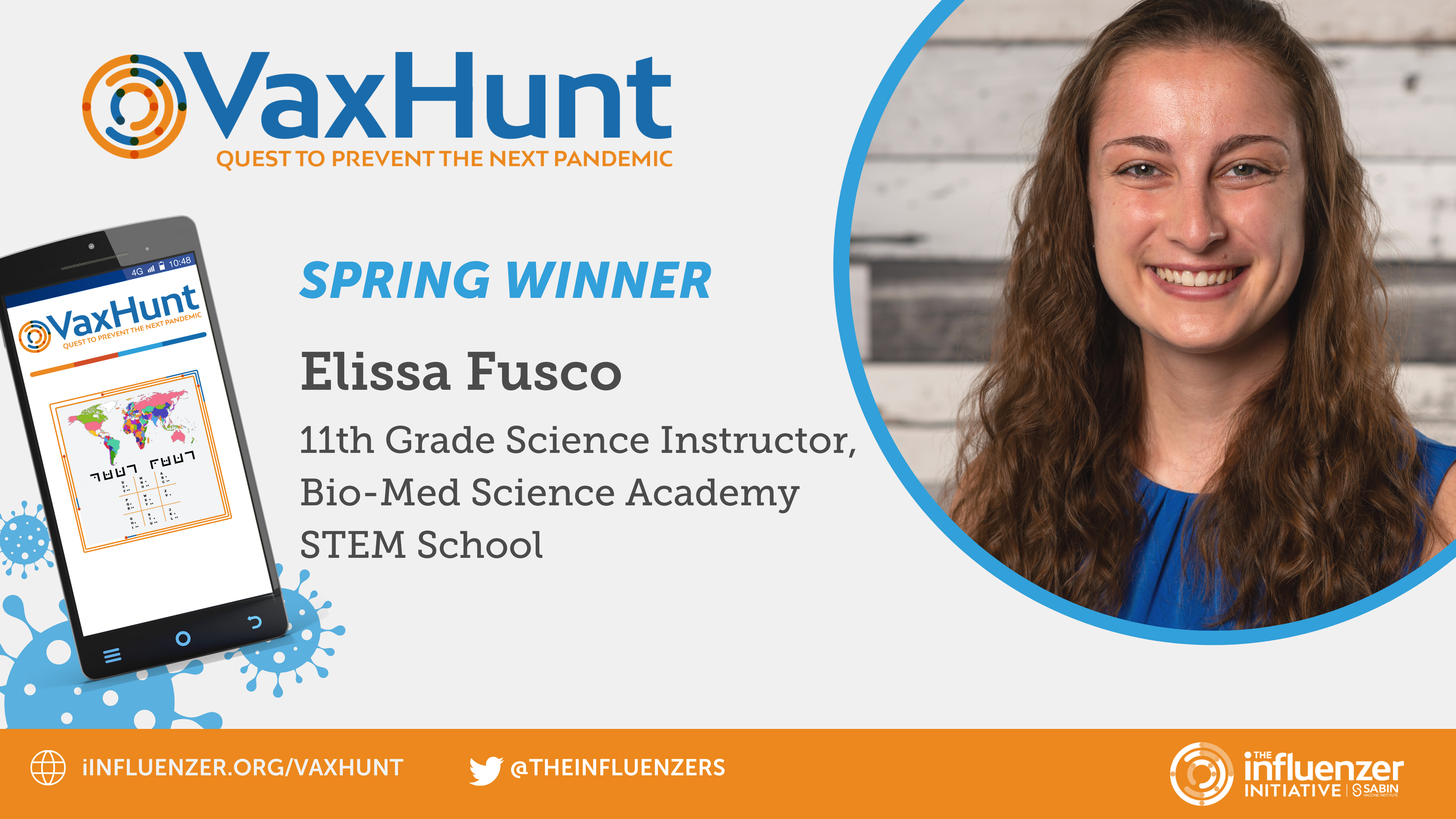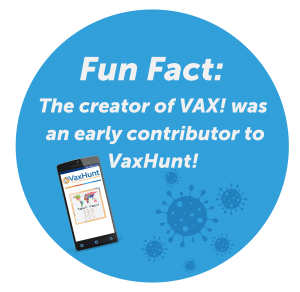High School Science Teacher Wins VaxHunt
The Influenzer Initiative catches up with the Spring 2021 winner of VaxHunt to learn about her experience as a STEM educator inspiring the new generation of virus hunters.

High School Science Teacher Wins VaxHunt
Elissa Fusco, an 11th grade science teacher at the Bio-Med STEM Academy in Ohio has won the Spring 2021 edition of VaxHunt. Sharing her place on the leaderboard was another Bio-Med Academy affiliate, a student in her class. We at the Influenzer Initiative are pleased to see students and educators exploring our online quest to prevent the next pandemic, so we (virtually) sat down with Elissa to learn more about student interest in biology and public health and her experience as a STEM educator since the emergence of SARS-CoV-2.
We created VaxHunt in response to COVID-19, a pandemic wake-up call to the ever-present threat an influenza pandemic poses to society. To prevent another pandemic, a universal influenza vaccine is imperative. This challenging mission will require scientific breakthroughs, disruptive policy and a new generation of bold flu fighters to accelerate critical vaccine research and development. Hear from Miss Elissa about her STEM inspiration, teaching life sciences during a global pandemic and using interactive games in the classroom.
What inspired you to become a science educator?
I had an amazing Biology teacher in high school that helped me find my passion for all things life science. It wasn’t until my junior year in college that I finalized my pathway towards education (it was always up in the air with research, education and medical school). I then graduated with my Bachelor’s in Molecular/Cellular Biology and my Master’s in Teaching. I’ve always loved helping students with their science work and showing new students that science can be difficult, but it doesn’t have to be scary. Science is also an amazing subject to practice other non-science skills like work endurance (those research papers, let me tell you), collaboration (all things labs) and curiosity (why doesn’t this work, what could we do differently?).
“I’ve always loved helping students with their science work and showing new students that science can be difficult, but it doesn’t have to be scary.”
What is it like teaching at Bio-Med Academy?
Teaching at BMSA has opened up my eyes to the incredible possibilities of what education can be in a non-traditional school setting. Students do a lot more hands-on learning through projects, labs and solving problems. We constantly schedule speakers to talk about career opportunities or demonstrate what they do for their job, so students get experience in the world outside of school. We look at the student holistically, not just their academic talents.
STEM is weaved into all curriculums. Teachers are always finding ways to integrate subjects, which allows students to visualize that learning is a lot more intertwined than looking at the subjects as completely separate entities.
How has COVID-19 reinforced the importance of STEM education?
The use of problem-solving we see in STEM education is probably the most useful skill that students can sharpen throughout this pandemic. Whether it’s technology, collaboration or working on a project, knowing how to tackle problems effectively and efficiently is priceless.
Have you seen an increase in interest from your students around subjects related to viruses and vaccines in response to COVID-19?
I have seen an increased interest in microbiology! We’ve looked a lot into I Contain Multitudes by Ed Yong. We’ve discussed the pros and cons of microbes and the dangers of over-sanitation and over-use of antibiotics. Many students are interested in knowing the bacterial inhabitants of different surfaces (which we studied earlier this school year with Lactobacillus agar plates). We’ve looked into the importance of microbial diversity for immune systems and how a well-diversified immune system can be helpful when novel diseases appear.
Do you use other games as teaching aids?
Yes, I have! We were able to secure a Labster subscription, which has been amazing for pre-labs and lab techniques, especially for virtual/absent students. There was also this game, VAX! I found that simulated a pandemic and utilizing vaccines and quarantine to save the population. However, I haven’t been able to find something like VaxHunt that utilizes more puzzles and riddles to solve than just following steps for a lab.
pandemic and utilizing vaccines and quarantine to save the population. However, I haven’t been able to find something like VaxHunt that utilizes more puzzles and riddles to solve than just following steps for a lab.
Can you describe your experience using VaxHunt in your classroom or playing yourself?
I really enjoyed the mix of questions, articles and learning the process of vaccinations. My students found the game entertaining, informative and challenging. They were shocked at some of the things they learned.
“Anything that poses a problem that needs to be fixed is perfect to peak student curiosity and problem solving.”
How can we make science an exciting and accessible field/subject for young people?
Integrating other subjects, like Math and Social Studies, is an excellent way to attract students who may not have an affinity for science. Someone may not be very strong or interested in science, but if you include those math riddles or historical events (like VaxHunt), they may be more motivated to participate and learn. Also, from a 7-12 licensed educator, I can easily attest to the fact that middle and high school students love weird topics. Dysfunction, dysbiosis, ecological disasters and solutions and anything that poses a problem that needs to be fixed is perfect to peak student curiosity and problem-solving.
What is the best way to inspire the next generation to dedicate their future knowledge and skills to solving the challenges that face society?
Always always always make content relatable. How can students use their knowledge that they’ve gained in their future? When will they ever use the information?
Who should play VaxHunt and why?
I would definitely say that VaxHunt is more accessible to high school/college students, but I think grades as low as 7th-8th should attempt it! Anyone who is interested in the health field and how to avoid or slow down the spread of novel diseases should play.
